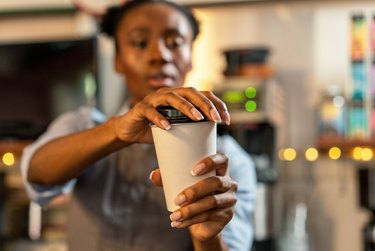
For many, a day without coffee is unimaginable. The popular beverage is enjoyed by millions for its rich taste and ability to increase energy levels, but it's not without some potential side effects.
What gives coffee its deep flavors — the acids — can also contribute to feeling queasy after drinking a cup. If you often feel nauseous after drinking coffee, here's why and what to do about it.
Video of the Day
Video of the Day
1. You Have Acid Reflux
Most coffees' pHs range from 4.85 to 5.10, which is on the acidic side of the pH scale, according to an October 2018 study in Scientific Reports.
The stomach is an already acidic environment, and because caffeinated coffee also contains acids, this increases the acidity in the stomach, which can cause tummy troubles. These acids can speed up the digestion of food, which is why some people feel the urgent need to use the restroom after drinking coffee.
The acid content in coffee can cause gastrointestinal symptoms like heartburn, acid reflux and bloating, according to Cleveland Clinic. These symptoms are caused by stomach acid becoming backed up in the esophagus (and are usually caused by highly acidic foods and drinks like coffee), according to Cedars-Sinai.
"For those who have acid reflux, drinking coffee might actually make you nauseous," says registered dietitian Marie Spano, RD, CSCS. Because coffee can trigger acid reflux, those who experience chronic acid reflux (aka gastroesophageal reflux disease or GERD) may be more prone to nausea after drinking coffee.
2. You Drink Coffee on an Empty Stomach
Many people head straight to the coffee pot in the morning, pouring themselves a cup before they've even had breakfast, and this could be a culprit of your coffee-induced nausea. Some people may even feel the urge to vomit after drinking coffee on an empty stomach.
"Coffee is highly acidic when poured on an empty stomach, which could irritate your stomach lining that may result in nausea in some people," says registered dietitian-nutritionist Mehak Naeem, RDN.
The acidity of coffee alone isn't to blame. The caffeine in coffee is a stimulant, which could also play a role. Caffeine stimulates gastric acid secretion, a digestive fluid that helps break down food, according to a July 2017 study in Proceedings of the National Academy of Sciences of the United States of America.
"It stimulates the release of gastrin that results in abdominal distress when produced in excess amounts. It also makes you feel nauseated. So before you drink coffee, eat some food," Naeem says.
3. You're on Certain Medications
Nausea is a common side effect of some medications and their interactions with the caffeine in coffee. These can include antibacterial drugs (like Cipro), some antidepressants (like MAOIs), and asthma drugs (like albuterol and theophylline), per AARP.
"Nausea is one of many possible side effects of a caffeine-medication interaction," says registered dietitian and clinical herbalist Jenna Volpe, RDN, LD. "People should always make sure to check the labels carefully when taking any medications to avoid food-drug interactions."
How to Prevent Nausea From Coffee
If you regularly experience nausea from coffee, you may consider cutting back — but also note that nausea is one of the side effects of caffeine withdrawal, according to the National Library of Medicine. (Nausea and vomiting are also symptoms of caffeine overdose, per Mount Sinai.)
If you plan on cutting back on coffee, go slow.
Pinpointing the cause of your coffee-induced nausea can help you take action to reduce it. Here are some dietitian-recommended places to start.
1. Switch to Low-Acid Coffee
Low-acid coffee options include dark roasts, decaf coffee, espresso and cold brew, according to Cleveland Clinic.
"If you can't bear to give up your cup of joe, try low-acid decaf coffee," Spano says. "It's much gentler on the stomach."
2. Add Milk or Cream
If you're wondering if drinking your coffee black makes a difference, it likely won't. If anything, you may experience more nausea drinking your coffee black than with milk or cream. Adding milk or cream to your coffee may cut the acidity and make it more tolerable on your stomach.
"Try cutting the coffee with some unsweetened milk substitute, a scoop of collagen peptides and a natural sweetener to the coffee instead of drinking it black," Volpe says.
3. Drink Coffee With a Meal
Food acts as a buffer with medication, and the same is true with coffee. To reduce nausea after drinking coffee, try eating a meal beforehand or at the same time.
"Don't drink coffee on an empty stomach if you feel nauseated. Eat calcium-rich food before drinking coffee and increase your daily water intake. The calcium in food helps neutralize stomach acid and the acidity of coffee," Naeem says.
- Scientific Reports: “Acidity and Antioxidant Activity of Cold Brew Coffee”
- Cleveland Clinic: “Why Does Coffee Bother My Stomach?”
- Cedars-Sinai: “Heartburn and Acid Reflux: What You Need to Know”
- Proceedings of the National Academy of Sciences of the United States of America: "Caffeine induces gastric acid secretion via bitter taste signaling in gastric parietal cells"
- National Library of Medicine: “Caffeine”
- Mount Sinai: “Caffeine overdose”
Was this article helpful?
150 Characters Max
0/150
Thank you for sharing!
Thank you for your feedback!